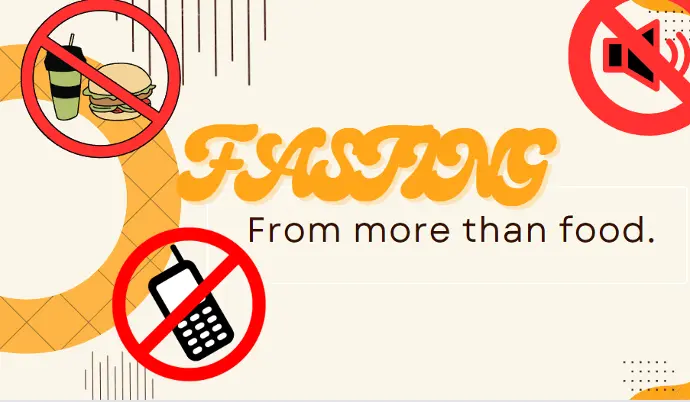Intro
Fasting is a practice best known as abstaining from food and sometimes water for a period of time. It is an ancient practice often associated with spiritual development.
Examples
For example, many Christian traditions are currently practicing fasting as a part of Lent - 40 days leading up to the celebration of the resurrection of Jesus. Practicing Muslims have just begun the month of Ramadan in which adults fast from dawn to sundown every day for a month as a discipline to grow closer to God. There are methods of fasting in Buddhism and other religions as well.
In recent years, the physical practice of “intermittent fasting” has become better known. This often involves, for example, fasting from food for 16 hours and only eating during the other 8 hours of a day. It is touted as beneficial for physical health.
Is fasting good for mental health as well?
My Thoughts
In both of the above cases, spiritual and physical, the practice of fasting involves denying oneself immediate physical desires for the sake of a greater gain. It is a discipline of sacrificing right now for a better future then. If we apply this concept to mental health, it is easy to see that fasting of all kinds can be useful in building resilience in the face of the many challenges we will face in life. In this context, fasting can be seen as a way of growing stronger in chosen sacrifices to prepare us to deal with unchosen challenges in the future. As such, fasting can be a powerful tool in learning to more effectively deal with issues like anxiety, depression and anger management.
Fasting can be seen not only as a physical discipline, denying the body what it is asking for, but also as a neurological discipline. When we fast, we learn to control our impulses to satisfy immediate needs. This control can only be done with conscious choice. Our brains are practicing regulating impulsive decision making through engaging the prefrontal cortex and the other decision making processes in our brain with stronger “executive functioning.”
Conclusion
In this perspective, fasting can be about many other things than food and drink. Here are some modern day ideas for you to consider:
A total screen fast. Some families do this together to focus on relationship building which is obviously compromised when we are all looking at our various screens. Consider taking a day or weekend and trying this with your family.
- A phone fast. (I know! Can you imagine??) Put your phone in safe keeping for 24 hours and discover what your brain does without that constant stimulation.
- Partial technology fasts. Abstain from a certain platform such as Netflix or Disney+ or from social media sites..
- Try a silent fast. Take even one hour and be alone with no input at all. This is a good one for the spring when it is nice to sit outside. Focus during the time you are silent on what is happening in your brain. Initially, this is a very difficult thing to do because we are used to a lot of things going on around us all the time.
In these and any other fasts that you can think of trying, it will be a challenge at first. But regular practice of fasting in any form is going to result in a greater resilience, a stronger brain, and a better you.
